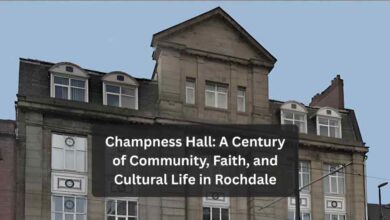Dawn Archer: Pioneering Voice in Linguistics and Forensic Communication

Dawn Archer is one of the most respected names in the field of linguistics, known internationally for her groundbreaking research in pragmatics, corpus linguistics, and forensic communication. Her career exemplifies the power of language as both an academic discipline and a practical tool with immense social impact. From analysing centuries-old courtroom transcripts to training modern-day police negotiators, Dawn Archer has shown how words shape truth, credibility, and justice.
Early Life and Education
Dawn Archer’s intellectual journey began with a strong grounding in both history and language. She studied for her BA in History and English Language, graduating with First Class Honours. Her fascination with the ways language reflects social structures led her to pursue further academic study. She completed her MA in Language Studies with Distinction, further sharpening her analytical skills before embarking on doctoral research.
In 2003, she earned her Ph.D. in Linguistics at Lancaster University, one of the United Kingdom’s leading centres for language research. Her doctoral studies laid the foundation for her specialisation in corpus linguistics and pragmatics. The combination of historical interest and linguistic expertise would later become the hallmark of her career.
Academic Career
Manchester Metropolitan University
Currently, Dawn Archer holds the post of Professor of Pragmatics and Corpus Linguistics at Manchester Metropolitan University (MMU). Here, she leads research projects, supervises doctoral candidates, and continues to publish widely on topics at the intersection of language, society, and law.
University of Central Lancashire
Before joining MMU, she served at the University of Central Lancashire (UCLan), where she played a major role in developing linguistics as a field of study. Her time there further enhanced her reputation as both an accomplished researcher and a dedicated teacher.
Research Expertise
Corpus Linguistics
Corpus linguistics involves the systematic study of language through large databases of real-world texts. Dawn Archer has been at the forefront of this methodology, creating annotation schemes and tools that enable researchers to explore language patterns across history and contemporary contexts.
Pragmatics
Her work in pragmatics focuses on how people use language to achieve specific goals, whether persuading, deceiving, or negotiating. By studying not just what people say but how and why they say it, she sheds light on the subtleties of human interaction.
Forensic Linguistics
One of her most widely recognised contributions is in forensic linguistics. By analysing how language operates in legal settings, she has helped uncover how questioning styles affect responses, how credibility is judged, and how deception can be detected.
Historical Linguistics
Dawn Archer has also made important contributions to historical linguistics, exploring how courtroom language and social dynamics played out in the seventeenth and eighteenth centuries. This work connects past communication practices with modern understandings of justice and fairness.
Publications and Notable Works
Dawn Archer has authored and edited several influential books and numerous academic papers. Two of her most well-known works are:
-
What’s in a Word-list? – A detailed study into the value and limitations of wordlists in linguistic research.
-
Questions and Answers in the English Courtroom (1640–1760) – A historical analysis of courtroom exchanges that highlights power dynamics, manipulation, and credibility in legal settings.
These publications are not only academic milestones but also resources that have influenced subsequent generations of researchers in linguistics and law.
Tools and Annotation Schemes
A distinctive part of her career is the development of tools for linguistic analysis. She contributed to the creation of:
-
VARD – A tool for standardising spelling in historical texts, which makes old manuscripts more accessible for modern research.
-
Historical Semantic Tagger – A system for tagging meaning in historical corpora, enabling more precise study of how words and concepts have evolved over time.
Such innovations demonstrate her commitment to both theoretical rigour and practical usability.
Applied Research and Public Engagement
Dawn Archer’s work extends beyond academia into the wider world. She has brought linguistic expertise to areas where communication is a matter of life, justice, and truth.
Forensic Expertise
Her expertise has been sought in real-world cases where understanding language could reveal deception or clarify interpretation. This applied dimension of her research highlights the social responsibility of linguistics.
Television Contributions
She appeared in the TV series Faking It: Tears of a Crime, where her insights into language helped expose inconsistencies in criminal accounts. By making forensic linguistics accessible to the public, she demonstrated the relevance of her field to everyday society.
Police Negotiator Training
Perhaps one of the most practical applications of her research is her work with UK police negotiators. By training officers in how language affects trust, credibility, and persuasion, she has contributed to more effective and ethical negotiation strategies.
Teaching and Mentorship
As a professor, Dawn Archer is deeply committed to education. She has supervised doctoral research, mentored young academics, and inspired students at every level. Her teaching emphasises not only linguistic theory but also critical thinking and application. She believes in equipping students with the tools to analyse language in real-world contexts, making education both practical and intellectually stimulating.
Influence and Legacy
Dawn Archer’s influence can be measured in several ways:
-
Academic Impact: Her research is widely cited in linguistics, pragmatics, and forensic studies.
-
Practical Application: From training police to contributing to legal investigations, her work has real-world consequences.
-
Public Awareness: By engaging with media and popular platforms, she has made linguistics visible to wider audiences.
-
Educational Contribution: Generations of students have benefited from her mentorship and rigorous approach to research.
Why Dawn Archer’s Work Matters Today
In a world where communication is central to politics, law, media, and everyday life, Dawn Archer’s research remains more relevant than ever. Her work on credibility and deception speaks directly to issues of misinformation and trust in the modern age. Her studies of historical language remind us that struggles over truth and fairness are not new, but part of a long continuum.
By bridging past and present, theory and practice, academic research and social application, she shows how linguistics is not a distant or abstract science but a vital tool for justice, clarity, and understanding.
Conclusion
Dawn Archer is far more than an academic. She is a pioneer who has shown how language shapes our world—whether in the courtroom, the classroom, or the wider society. Her research in corpus linguistics, pragmatics, and forensic communication has set new standards in the discipline. Her applied work, from police training to television contributions, has demonstrated the practical power of linguistics.
For students of language, she is a guide. For practitioners of law and justice, she is an invaluable resource. For the public, she is proof that language matters deeply in shaping truth and society.



